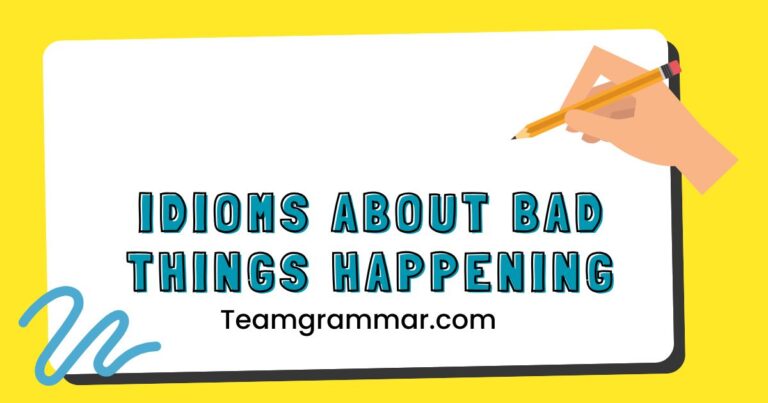41 Idioms for Crazy Person: Understanding Figurative Language
Idioms are a colorful and essential part of the English language, adding depth and nuance to our conversations. When discussing someone perceived as behaving erratically or irrationally, a variety of idioms come into play.
Understanding these idioms is crucial not only for comprehending spoken and written English but also for appreciating the cultural context in which they are used. This article will explore various idioms used to describe someone who is considered “crazy,” examining their meanings, origins, and appropriate usage.
This guide will benefit English language learners, ESL/EFL teachers, and anyone interested in expanding their understanding of figurative language.
Table of Contents
- Introduction
- Definition of Idioms for “Crazy Person”
- Structural Breakdown of Idioms
- Types and Categories of Idioms
- Examples of Idioms for “Crazy Person”
- Usage Rules for Idioms
- Common Mistakes with Idioms
- Practice Exercises
- Advanced Topics
- FAQ
- Conclusion
Definition of Idioms for “Crazy Person”
An idiom is a phrase or expression whose meaning cannot be understood from the literal meanings of its individual words. Instead, it has a figurative meaning that is known through common usage.
Idioms related to describing someone as “crazy” or “insane” are used to convey that a person is acting irrationally, unpredictably, or in a manner that deviates significantly from societal norms. These idioms often carry cultural connotations and can range from humorous to derogatory.
The function of these idioms is to add color and emphasis to descriptions. Rather than simply stating that someone is behaving strangely, an idiom can paint a more vivid picture or convey a particular attitude towards the person’s behavior.
The context in which these idioms are used is crucial; some may be appropriate in informal conversations but unsuitable for formal or professional settings. It’s important to be sensitive to the potential offensiveness of certain idioms, especially those that perpetuate negative stereotypes about mental health.
Structural Breakdown of Idioms
Idioms, by their nature, defy straightforward structural analysis because their meaning is not compositional. However, we can examine the grammatical components that make up these phrases.
Many idioms consist of a verb and a preposition (e.g., “off his rocker”), while others involve nouns and adjectives (e.g., “a few sandwiches short of a picnic”). The individual words contribute to the overall imagery, even if they don’t directly translate to the idiom’s intended meaning.
Understanding the grammatical structure of an idiom can sometimes aid in remembering it and using it correctly. For instance, knowing that “bats in the belfry” involves a noun phrase (“bats”) and a prepositional phrase (“in the belfry”) can help you recall the complete idiom.
However, the key is always to learn the idiom as a unit, rather than trying to deduce its meaning from its individual parts.
Types and Categories of Idioms
Idioms for describing someone as “crazy” can be categorized based on the imagery they evoke or the specific aspect of “craziness” they emphasize. Here are a few categories:
Loss of Reason
These idioms suggest that the person has lost their ability to think rationally.
Eccentric Behavior
These highlight unusual or odd behavior that is not necessarily harmful but deviates from the norm.
Mental Instability
These idioms imply a more serious mental or emotional problem.
Humorous or Lighthearted
These are used in a joking or teasing manner, often to describe someone who is being silly or nonsensical.
Examples of Idioms for “Crazy Person”
Below are several tables showcasing idioms used to describe someone who is considered “crazy,” categorized for clarity.
Idioms Suggesting Loss of Reason
This table provides examples of idioms that suggest someone has lost their ability to think rationally or is behaving in an illogical manner.
| Idiom | Meaning | Example Sentence |
|---|---|---|
| Off his/her rocker | Mentally unstable or crazy. | Ever since the accident, he’s been a little off his rocker. |
| Out of his/her mind | Acting irrationally or insanely. | You must be out of your mind to agree to such a risky deal. |
| Round the bend | Crazy or insane. | Working these long hours is driving me round the bend. |
| Lost his/her marbles | Lost one’s sanity or good sense. | Grandpa seems to have lost his marbles lately; he keeps forgetting things. |
| Not all there | Not fully mentally present or sane. | After the illness, she wasn’t quite all there. |
| A screw loose | Slightly crazy or eccentric. | I think he’s got a screw loose; he’s always doing strange things. |
| Gone bananas | Become crazy or wildly excited. | The crowd went bananas when the band started playing. |
| Batty | Slightly crazy or eccentric. | My aunt is a bit batty, but she’s a lot of fun. |
| Off his/her trolley | Crazy or eccentric (British English). | He’s completely off his trolley if he thinks that’s a good idea. |
| Out to lunch | Not paying attention or slightly crazy. | He seems a bit out to lunch today; I don’t think he’s heard a word I’ve said. |
| Crackers | Crazy or insane (British English). | You’d be crackers to turn down such a good offer. |
| Bonkers | Crazy or silly (British English). | The plan is utterly bonkers, but it just might work. |
| Mad as a hatter | Completely insane. | She’s as mad as a hatter, but she’s brilliant. |
| One sandwich short of a picnic | Not very intelligent or slightly crazy. | He’s a bit one sandwich short of a picnic, but he’s harmless. |
| Not the full shilling | Not very intelligent or slightly crazy. | I don’t think he’s quite the full shilling, if you know what I mean. |
| A few bricks short of a load | Not very intelligent or slightly crazy. | He’s a few bricks short of a load, but he’s a good-hearted person. |
| Not wrapped too tight | Slightly crazy or eccentric. | She’s not wrapped too tight, but she’s always entertaining. |
| Lost it | Lost control of one’s emotions or sanity. | He completely lost it when he heard the news. |
| Around the twist | Crazy or eccentric. | She’s a little around the twist, but she’s a brilliant artist. |
| Off the deep end | Become crazy or irrational. | He went off the deep end after losing his job. |
| Got bats in the belfry | Crazy or eccentric. | You’ve got bats in the belfry if you think that’s going to work. |
| Mad as a March hare | Completely insane. | He’s as mad as a March hare, always chasing after wild ideas. |
| Not right in the head | Mentally unsound or crazy. | After the accident, he just wasn’t right in the head. |
Idioms Describing Eccentric Behavior
This table lists idioms that describe behavior that is unusual or odd but not necessarily indicative of mental illness.
| Idiom | Meaning | Example Sentence |
|---|---|---|
| A bit of a character | An eccentric or unusual person. | He’s a bit of a character, always wearing mismatched socks. |
| Marches to the beat of his/her own drum | Behaves independently and unconventionally. | She marches to the beat of her own drum and doesn’t care what others think. |
| His/her elevator doesn’t go all the way to the top floor | Not very intelligent or slightly crazy. | I don’t think his elevator goes all the way to the top floor, but he’s a nice guy. |
| A strange bird | An odd or eccentric person. | He’s a bit of a strange bird, but he’s harmless. |
| A weirdo | A strange or eccentric person. | Some people think she’s a weirdo because she collects unusual things. |
| An oddball | An eccentric or unusual person. | He’s a bit of an oddball, but he’s a brilliant scientist. |
| Off the wall | Unconventional or eccentric. | His ideas are often off the wall, but they’re also very creative. |
| Out there | Eccentric or unconventional. | She’s a bit out there, but she’s a lot of fun to be around. |
| Quirky | Having peculiar or unusual habits or characteristics. | She has a quirky sense of humor that not everyone understands. |
| Unique | Being the only one of its kind; unusual or special. | He has a unique way of looking at the world. |
| Different | Not the same as another or each other; unlike in nature, form, or quality. | She’s different from everyone else I know. |
| Unconventional | Not based on or conforming to what is generally done or believed. | His unconventional approach to problem-solving often yields surprising results. |
| Bohemian | Socially unconventional in an artistic way. | They live a bohemian lifestyle, traveling and creating art. |
| Free spirit | A person who thinks and acts in an unconstrained or unconventional way. | She’s a free spirit who doesn’t like to be tied down. |
| Maverick | An unorthodox or independent-minded person. | He’s a maverick in the business world, always challenging the status quo. |
| Individualist | A person who is independent and self-reliant. | She’s an individualist who prefers to do things her own way. |
| Eccentric | Unconventional and slightly strange. | His eccentric behavior makes him stand out in a crowd. |
| Idiosyncratic | Peculiar or individual. | Her idiosyncratic style is what makes her art so unique. |
| Offbeat | Unconventional and slightly strange. | His offbeat sense of humor always catches people off guard. |
Idioms Implying Mental Instability
This table contains idioms that suggest a more serious mental or emotional problem, and should be used with caution.
| Idiom | Meaning | Example Sentence |
|---|---|---|
| Not playing with a full deck | Not very intelligent or slightly crazy. | I don’t think he’s playing with a full deck; he’s always making strange decisions. |
| Lost his/her mind | Become insane or irrational. | He seems to have lost his mind after the accident. |
| Going postal | Becoming extremely angry and violent. | He went postal after being fired from his job. |
| Unhinged | Mentally unbalanced; deranged. | She seemed completely unhinged after the breakup. |
| Nuts | Crazy or insane. | You’re nuts if you think that’s a good idea. |
| Psycho | A mentally unstable or dangerous person. | He acted like a complete psycho when he found out. |
| Deranged | Mad; insane. | The killer was described as deranged by the police. |
| Cracked | Mentally ill; insane. | He’s a bit cracked, but he’s harmless. |
Humorous or Lighthearted Idioms
This table presents idioms used in a joking or teasing manner to describe someone who is being silly or nonsensical.
| Idiom | Meaning | Example Sentence |
|---|---|---|
| Silly goose | A foolish or silly person. | You silly goose, you forgot your keys! |
| Goofy | Foolish or silly. | He’s a bit goofy, but he’s always fun to be around. |
| Nutty as a fruitcake | Very eccentric or crazy. | She’s as nutty as a fruitcake, but we love her anyway. |
| A loon | A crazy or foolish person. | He’s a bit of a loon, but he’s harmless. |
| A card | An amusing or eccentric person. | He’s such a card, always cracking jokes. |
| Wacky | Funny or eccentric in a silly way. | She has a wacky sense of humor that always makes me laugh. |
| Zany | Amusingly unconventional and idiosyncratic. | His zany antics always entertain the crowd. |
| Daft | Silly or foolish. | Don’t be daft! Of course, I’ll help you. |
Usage Rules for Idioms
Using idioms correctly involves understanding their specific meanings and the contexts in which they are appropriate. Here are some key rules to follow:
- Context is Key: Always consider the situation and your audience. Some idioms are informal and may not be suitable for professional or formal settings.
- Cultural Sensitivity: Be aware that some idioms can be offensive or perpetuate negative stereotypes. Avoid using idioms that are derogatory or insensitive.
- Meaning and Nuance: Understand the specific meaning of the idiom before using it. Idioms can have subtle nuances that affect their appropriateness in certain situations.
- Grammatical Consistency: While idioms don’t follow regular grammatical rules in terms of meaning, ensure that you use the correct grammatical form of the idiom itself. For example, use the correct tense of the verb within the idiom.
- Overuse: Avoid overusing idioms, as it can make your speech sound unnatural or forced. Use them sparingly to add color and emphasis.
Common Mistakes with Idioms
One common mistake is taking idioms literally, which leads to misunderstanding their intended meaning. Another mistake is using an idiom in the wrong context, making the communication inappropriate or confusing.
Here are some examples of common errors:
| Incorrect | Correct | Explanation |
|---|---|---|
| He is literally off his rocker. | He is off his rocker. | “Off his rocker” is an idiom, so it shouldn’t be taken literally. |
| She went bananas at the board meeting. | She got very angry at the board meeting. | “Went bananas” is too informal for a board meeting; a more formal expression is needed. |
| They are not playing with a whole deck of cards. | They are not playing with a full deck. | The correct idiom is “not playing with a full deck,” not “a whole deck of cards.” |
Practice Exercises
Test your understanding of idioms with these practice exercises.
Exercise 1: Matching
Match the idioms with their correct meanings.
| Idiom | Meaning | Answer |
|---|---|---|
| 1. Off his rocker | A. Very eccentric or crazy | |
| 2. Round the bend | B. Not very intelligent or slightly crazy | |
| 3. Not playing with a full deck | C. Mentally unstable or crazy | |
| 4. Nuts as a fruitcake | D. Crazy or insane |
Answers: 1-C, 2-D, 3-B, 4-A
Exercise 2: Fill in the Blanks
Complete the sentences with the appropriate idiom.
| Sentence | Possible Answers | Answer |
|---|---|---|
| 1. After working non-stop for 36 hours, I felt like I was going __________. | (a. bananas, b. to the store, c. home) | |
| 2. Ever since the accident, he’s been a little __________. | (a. off his rocker, b. on his game, c. in his prime) | |
| 3. You must be __________ to agree to such a risky deal. | (a. out of your mind, b. in your element, c. on your toes) | |
| 4. My neighbor is a bit __________, but he’s a nice guy. | (a. a strange bird, b. an early bird, c. a night owl) |
Answers: 1-a, 2-a, 3-a, 4-a
Exercise 3: True or False
Determine whether the following statements are true or false based on the correct usage of idioms.
| Statement | Answer |
|---|---|
| 1. It’s appropriate to say someone “went bananas” during a formal business presentation. | |
| 2. Saying someone is “off their rocker” implies they are behaving irrationally or are mentally unstable. | |
| 3. “A screw loose” suggests a slight eccentricity, not necessarily a severe mental issue. |
Answers: 1-False, 2-True, 3-True
Exercise 4: Sentence Completion
Choose the best idiom to complete each sentence, considering the context.
| Sentence | Idiom Choices | Answer |
|---|---|---|
| 1. After losing all his money, he seemed to have completely __________. | (a) marched to the beat of his own drum (b) lost his marbles (c) found his way | |
| 2. She’s a bit __________, always wearing bright colors and mismatched shoes. | (a) out to lunch (b) a bit of a character (c) on the ball | |
| 3. If you think you can get away with cheating on the final exam, you’re __________. | (a) around the bend (b) on the right track (c) barking up the wrong tree |
Answers: 1-b, 2-b, 3-a
Exercise 5: Contextual Usage
Rewrite the following sentences, replacing the underlined phrases with a suitable idiom from the article.
| Sentence | Answer |
|---|---|
| 1. He’s acting irrationally since the accident. | |
| 2. She behaves independently and doesn’t care what others think. | |
| 3. The crowd became wildly excited when the band started playing. |
Answers:1. He’s been off his rocker since the accident. 2.
She marches to the beat of her own drum and doesn’t care what others think. 3. The crowd went bananas when the band started playing.
Advanced Topics
For advanced learners, exploring the etymology and historical context of these idioms can provide deeper insights. For example, “mad as a hatter” is believed to originate from the use of mercury in hat-making, which caused neurological damage in hatters.
Understanding the origins of idioms can help you appreciate their cultural significance and use them more effectively.
Another advanced topic is the use of idioms in literature and media. Authors and filmmakers often use idioms to add depth and authenticity to their characters and stories.
Analyzing how idioms are used in different contexts can improve your comprehension and appreciation of English language literature and film.
FAQ
- What is an idiom?
An idiom is a phrase or expression whose meaning cannot be understood from the literal meanings of its individual words. It has a figurative meaning that is known through common usage.
- Why are idioms important?
Idioms add color, depth, and nuance to the English language. Understanding idioms is crucial for comprehending spoken and written English and appreciating the cultural context in which they are used.
- Can idioms be translated literally?
No, idioms cannot be translated literally because their meaning is figurative. A literal translation will likely result in a nonsensical or incorrect interpretation.
- Are idioms universal across cultures?
No, idioms are not universal. They are often specific to a particular language and culture. What might be a common idiom in English could be completely foreign to someone from another culture.
- How can I learn more idioms?
Read widely, listen to native speakers, and use idiom dictionaries or online resources. Pay attention to how idioms are used in context and practice using them in your own speech and writing.
- Is it okay to use idioms in formal writing?
It depends on the idiom and the tone of the writing. Some idioms are informal and not suitable for formal writing, while others may be acceptable if used sparingly and appropriately.
- What should I do if I don’t understand an idiom?
Ask for clarification. Don’t be afraid to ask a native speaker or consult a dictionary for the meaning of the idiom.
- How can I avoid misusing idioms?
Pay attention to the context in which idioms are used, understand their specific meanings, and practice using them correctly. If you’re unsure, it’s better to use a more straightforward expression.
- Are there idioms that should be avoided?
Yes, some idioms can be offensive or perpetuate negative stereotypes. It’s important to be sensitive to the potential impact of your words and avoid using idioms that are derogatory or insensitive.
- What are some resources for learning idioms?
There are many online resources, idiom dictionaries, and language learning apps that can help you learn idioms. Reading books and watching movies in English can also expose you to a variety of idioms in context.
Conclusion
Understanding idioms related to describing someone as “crazy” is essential for mastering the nuances of the English language. These idioms add color and expressiveness to our communication, but they must be used with care and sensitivity.
By learning the meanings, origins, and appropriate contexts for these idioms, you can enhance your comprehension and communication skills. Remember to consider your audience, be mindful of cultural sensitivities, and practice using idioms correctly to avoid misunderstandings.
Continue to explore and expand your knowledge of idioms to become a more proficient and confident English speaker.







